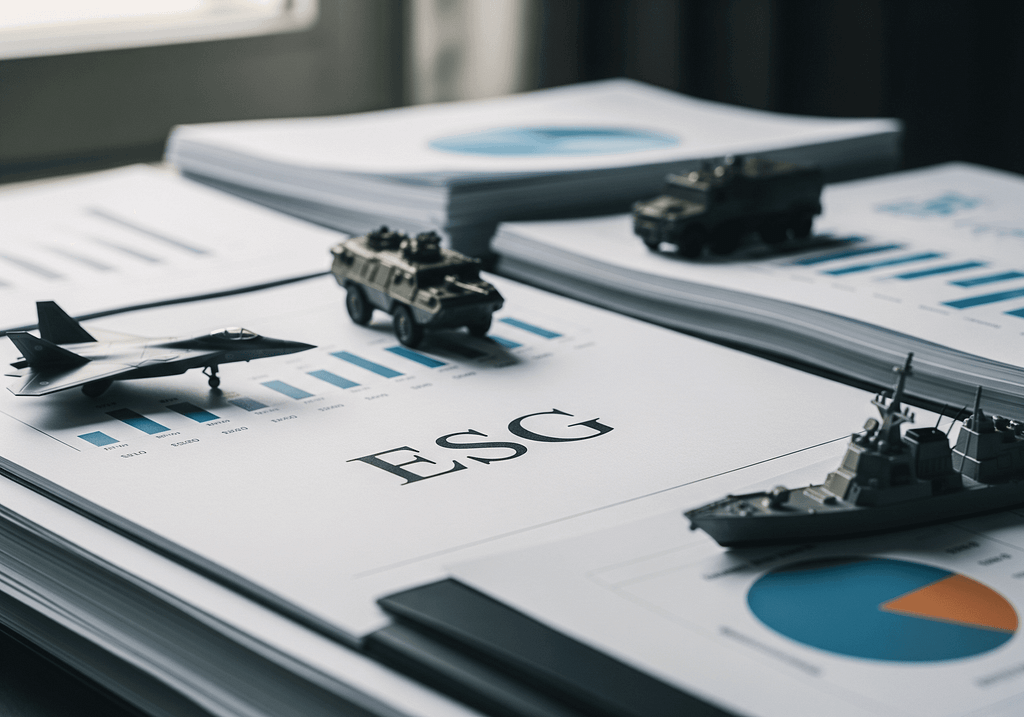The European ESG fund market worth nearly 9 trillion euros is undergoing radical transformation after more than half of these ethically focused funds began investing in defense companies manufacturing nuclear weapons. The number of ESG equity funds exposed to the defense industry has grown by more than 50 percent since February 2022 to over 2,000 funds, representing a fundamental reassessment of sustainable investing principles.
Specific numbers reveal the scope of ESG fund transformation
Active ESG European equity funds tripled their exposure to the defense sector over the past three years. By March 2025, average allocation to aerospace and defense stocks reached 1.9 percent, approaching standard non-ESG funds with 2.3 percent.
Article 8 funds more than doubled their involvement in controversial weapons to 1.1 percent and military contracts to 2.3 percent by May 2025. These figures document a fundamental shift in investment strategy of funds labeled as ethical.
ESG criteria adapt to the reality of defense companies
The key catalyst for this change became the official stance of the European Commission. Within the ReArm Europe/Readiness 2030 plan, the Commission approved additional defense spending of up to 800 billion euros in the coming years and officially confirmed that “the EU sustainable finance framework is compatible with investing in the defense sector.”
The European Investment Bank will double defense investments to 2 billion euros annually and relaxed criteria to support projects including drones, space technologies, and cybersecurity. A study for the Commission identified a capital gap of 1-2 billion euros and debt gap of 2 billion euros in the EU defense sector.
Investment companies remove defense industry exclusions from their portfolios
In response to the changing regulatory environment, major asset managers began systematically removing exclusions for the defense industry from their ethical funds. Allianz Global Investors eliminated exclusion criteria for Article 8 funds in military equipment and nuclear weapons permitted under the Non-Proliferation Treaty.
UBS Asset Management stepped back from policies prohibiting investments in companies generating more than 10 percent of revenue from conventional military weapons manufacturing. Danske Bank Asset Management removed approximately 30 defense companies from their exclusion lists. These steps demonstrate a coordinated approach to reassessing ESG criteria.
Controversial weapons remain a problematic category for ethical funds
Despite liberalization of approaches to the defense sector, the definition of “controversial weapons” remains a key question for ethical investing. Morningstar Sustainalytics categorizes controversial weapons as systems with indiscriminate long-term impacts on civilians:
- Anti-personnel mines and biological weapons
- Chemical weapons and cluster munitions
- Nuclear weapons and depleted uranium
- White phosphorus and similar systems
Many funds, however, create exceptions for companies involved in nuclear weapons in countries signatory to the Non-Proliferation Treaty. The result is that only 52 percent of ESG funds contain exposure to military weapons compared to 67 percent of conventional funds.
Geopolitical conflicts deepen the dilemma for ESG investors
Current global conflicts further complicate ESG investor decision-making regarding ethical investments in defense stocks. The Gaza crisis complicated the situation especially in the USA, where only 32 percent of Americans supported Israeli military actions in August 2025. This shift influenced ethical fund flows by excluding defense suppliers like Lockheed Martin and Raytheon supplying systems to Israel.
Conversely, Swedish defense company Saab benefited from supporting Ukrainian defense and recorded growth in shareholder numbers from 45-50 thousand before the war to more than 175 thousand. Different perceptions of individual conflicts thus create inconsistent approaches to defense investments in ethical funds.
ESG investing seeks new balance between ethics and reality
The current transformation of ESG funds reflects the fundamental question of how to reconcile ethical principles with geopolitical reality. If all Article 8 funds invested 5 percent of assets and Article 6 funds invested 10 percent into the EU defense sector, it would correspond exactly to the 800 billion euro ReArm EU plan.
Investors thus face a paradox between traditional ethical criteria and national security needs. While 60 percent of investments for European defense companies still come from American financiers, European ESG investors are gradually reassessing their positions. The question remains whether current adaptation represents a temporary response to crisis periods or permanent paradigm change in ethical investing.




